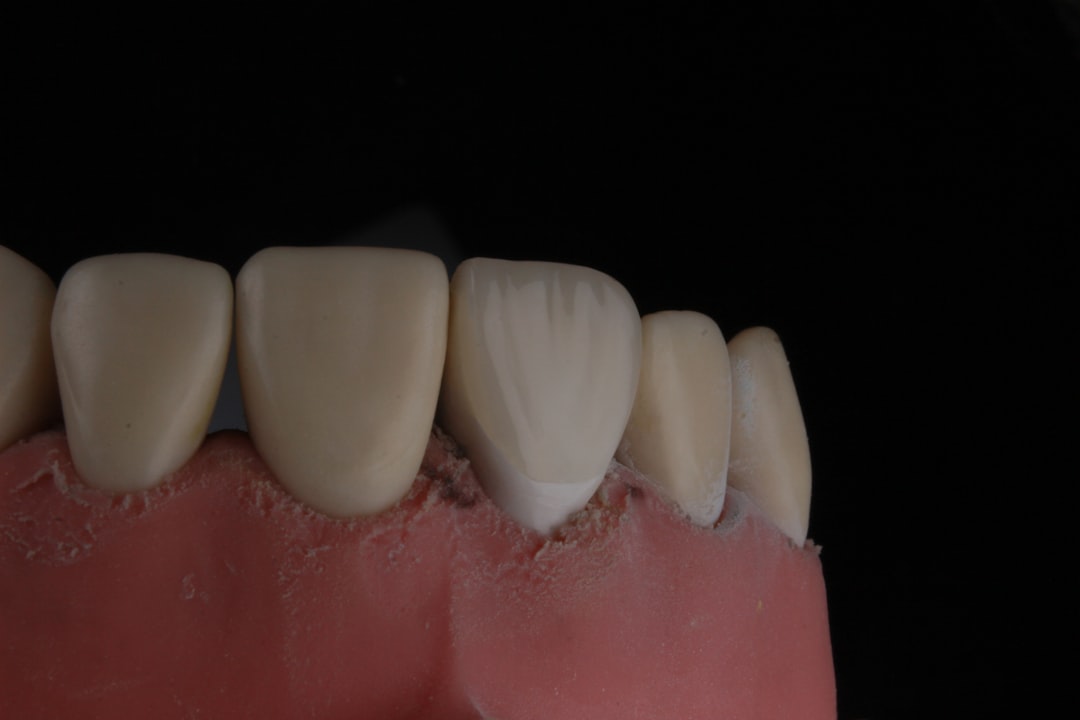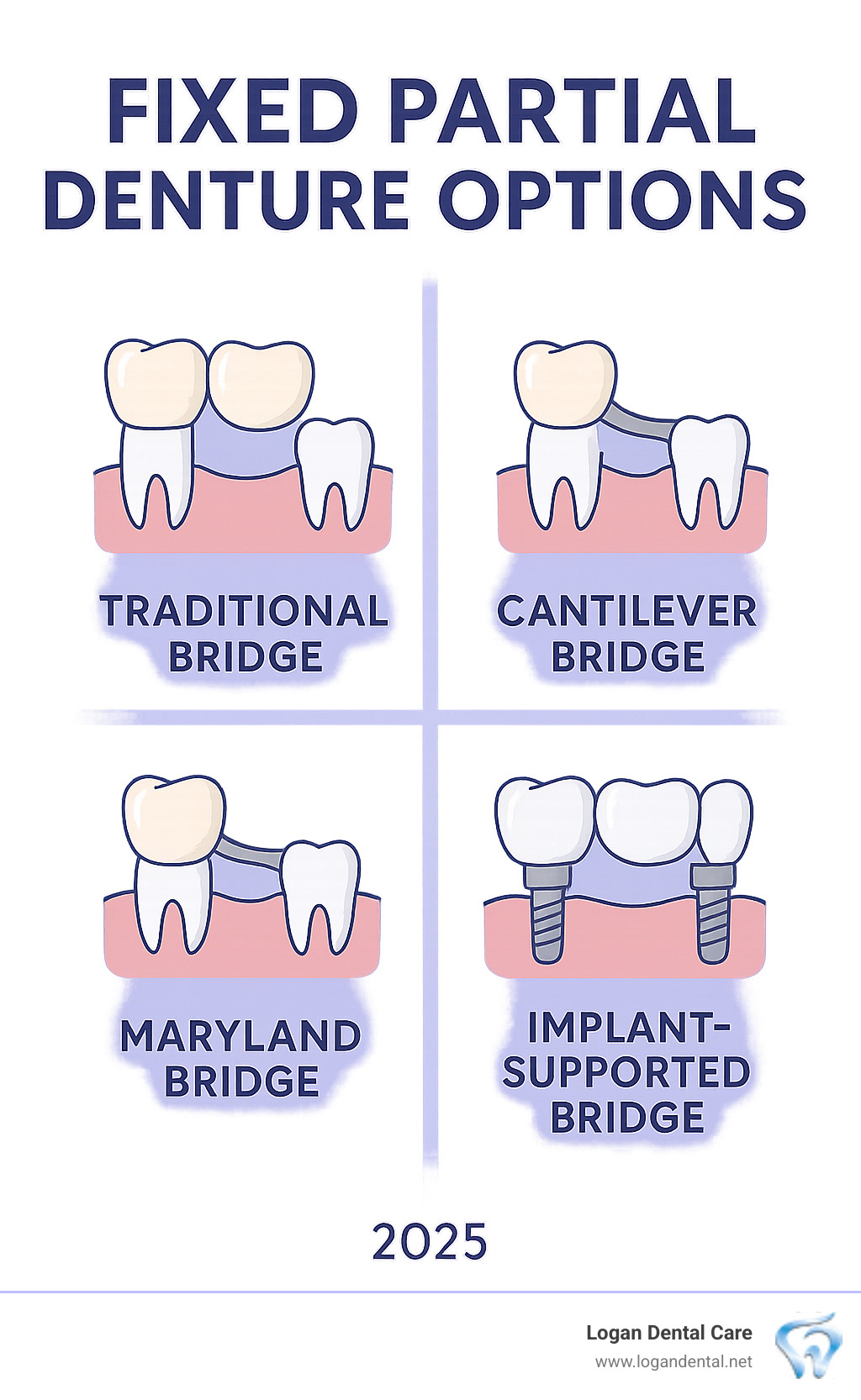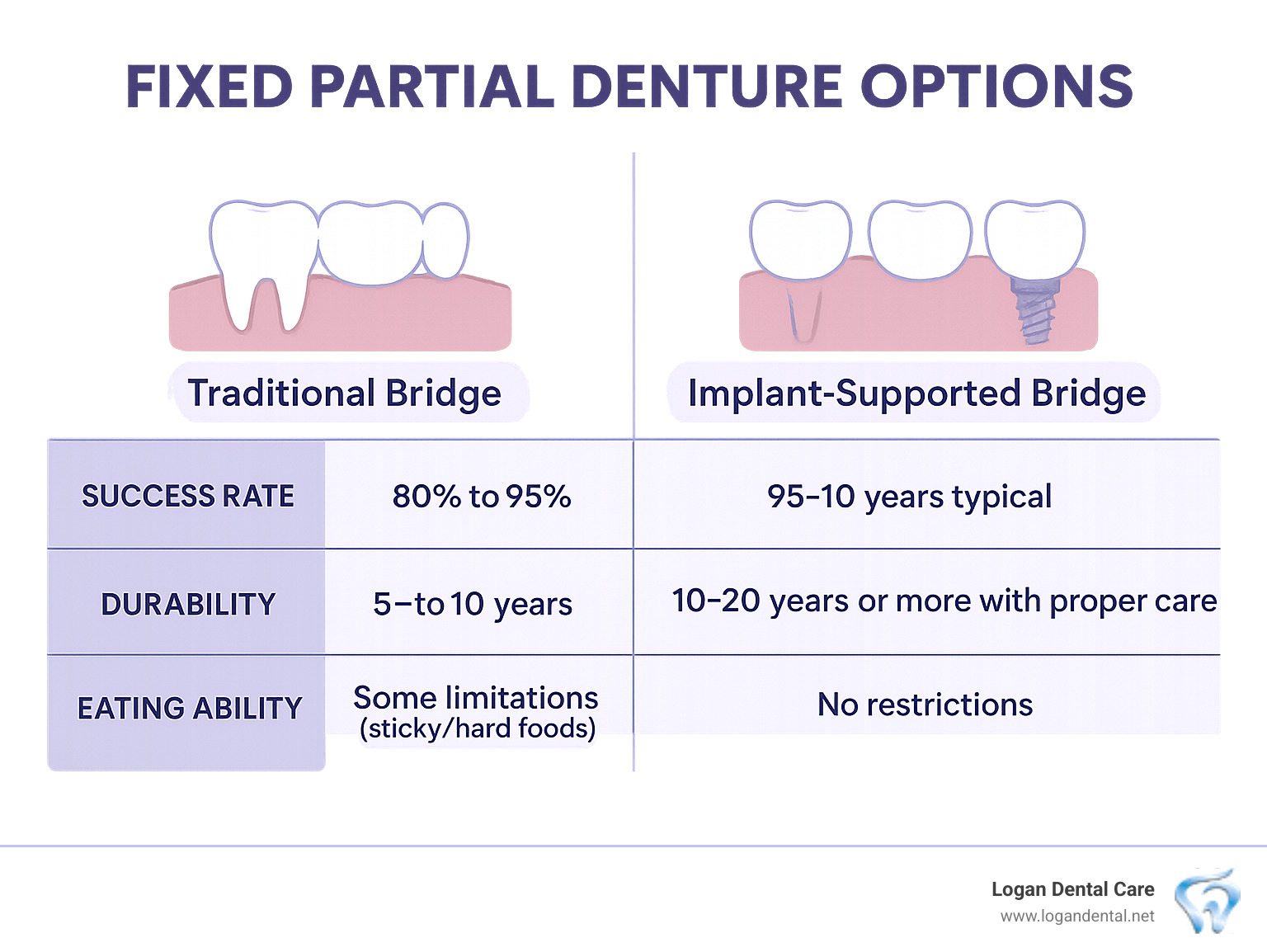Partial to Dentures? Your Guide to Fixed Partial Denture Options

Why Fixed Partial Denture Options Matter for Your Smile
When you're missing teeth, fixed partial denture options offer permanent solutions that can transform both your smile and your quality of life. Unlike removable dentures, these treatments stay in place 24/7, giving you the confidence to eat, speak, and smile naturally.
Quick Overview of Fixed Partial Denture Options:
- Traditional Bridge - Crowns on adjacent teeth support replacement teeth ($3,000-$5,000)
- Cantilever Bridge - Supported by teeth on one side only
- Maryland Bridge - Metal framework bonded to back of adjacent teeth ($1,500-$2,500)
- Implant-Supported Bridge - Anchored to dental implants in jawbone ($5,000-$15,000)
Did you know that nearly half of American adults are missing at least one tooth? Whether from decay, injury, or gum disease, tooth loss affects millions of people. The good news is that fixed partial dentures (also called dental bridges) provide stable, long-lasting solutions that look and feel like natural teeth.
A fixed partial denture is essentially a prosthetic device that fills the gap left by missing teeth. It consists of artificial teeth (called pontics) that are permanently attached to crowns placed on adjacent teeth or dental implants. This creates a "bridge" across the empty space, restoring your ability to chew, speak clearly, and smile with confidence.
The treatment can last 10-20 years with proper care, making it a smart investment in your oral health. Plus, it prevents remaining teeth from shifting into the empty space, which can cause bite problems and additional tooth loss over time.

Exploring Your Fixed Partial Denture Options
The Main Types of Fixed Dental Bridges
When exploring your fixed partial denture options, you'll find four main types of dental bridges, each designed for different situations and needs. Think of choosing a bridge like picking the right tool for the job – what works perfectly for one person might not be ideal for another.
The traditional bridge is our most popular choice, and for good reason. It works by placing crowns on the healthy teeth on either side of your gap (we call these abutment teeth) and connecting them with artificial teeth called pontics. This creates a sturdy, permanent restoration that can handle all your normal chewing. We craft these bridges from beautiful materials like porcelain or zirconia that blend seamlessly with your natural teeth.
Sometimes you might only have teeth on one side of the gap, which is where a cantilever bridge comes in handy. This type anchors to teeth on just one side, making it perfect for front teeth where the chewing forces are lighter. However, we typically don't recommend cantilever bridges for back teeth since they can put extra stress on the supporting teeth over time.
For a more conservative approach, the Maryland bonded bridge (also called a resin-bonded bridge) might be perfect for you. Instead of covering your adjacent teeth with crowns, this clever design uses thin metal or ceramic wings that bond to the back of your natural teeth. It's especially great for younger patients or anyone who wants to preserve as much of their natural tooth structure as possible.
The gold standard in fixed partial denture options is the implant-supported bridge. This advanced solution uses titanium posts surgically placed in your jawbone as anchors. After a healing period called osseointegration, these implants fuse with your bone, creating incredibly stable support. The best part? Your natural teeth stay completely untouched.
Ready to learn more about these options? Check out our detailed information on Crowns and Bridges and Dental Implants.
The Benefits of Choosing a Fixed Solution
Choosing a fixed solution for your missing teeth brings life-changing benefits that go far beyond just filling the gap. Let's talk about how these treatments can transform your daily life.
Restored chewing ability is often the first benefit our patients notice. Remember struggling to eat your favorite foods? Fixed bridges bring back the joy of eating without worry. Unlike removable dentures that can slip and slide, your fixed bridge stays put, letting you bite into an apple or enjoy a steak dinner with confidence.
Your improved speech will surprise you too. Missing teeth can make you whistle on certain words or cause that frustrating lisp. Fixed bridges restore proper tongue placement, helping you speak clearly and confidently in important meetings or family gatherings.
The improved aesthetics of modern bridges are truly remarkable. Using advanced materials like porcelain and zirconia, we can match your existing teeth so perfectly that even you might forget which ones are replacements. This natural appearance does wonders for your self-confidence.
Here's something many people don't realize: missing teeth affect your entire facial structure. Your teeth support your facial muscles and maintain proper facial height. Fixed bridges help maintain your facial structure, preventing that sunken appearance that can make you look older than your years.
One of the most important benefits is how fixed bridges prevent tooth shifting. Nature doesn't like empty spaces, so your remaining teeth will gradually drift into the gap, causing bite problems and making future treatment more complicated. A fixed bridge keeps everything in its proper place.
The durability and stability of fixed bridges make them an excellent long-term investment. With proper care, they can last 10-20 years or even longer. You'll enjoy the longevity and peace of mind that comes with a permanent solution.
Most importantly, fixed bridges restore your patient confidence. No more worrying about dentures slipping during important conversations or avoiding certain foods. Many of our patients tell us they forget they even have a bridge – it just feels like part of them.
Want to explore how these benefits can improve your appearance? Learn more about our Cosmetic Dentistry services.
The FPD Procedure: What to Expect
Understanding what happens during your fixed partial denture procedure helps ease any anxiety and lets you plan accordingly. At Logan Dental Care, we believe in keeping you informed every step of the way.
Your journey begins with an initial consultation where we'll take a comprehensive look at your mouth, teeth, and gums. We'll discuss your goals and explain all your options, making sure you feel comfortable with the treatment plan before moving forward.
During tooth preparation (for traditional and cantilever bridges), we'll use local anesthesia to keep you comfortable while carefully reshaping your abutment teeth. This creates the perfect foundation for your new crowns. Don't worry – this process is much gentler than most people expect.
Next comes dental impressions, where we create detailed molds of your prepared teeth. We might use traditional impressions or our advanced digital scanning technology for the most accurate results. We'll also select the perfect shade to match your natural teeth.
You'll receive a temporary bridge to protect your prepared teeth and maintain your smile while your permanent bridge is being crafted. This temporary solution lets you eat and speak normally during the 2-3 week waiting period.
For implant-supported bridges, there's a special healing period called osseointegration where your jawbone grows around the implant posts. This typically takes 3-6 months, but it's what makes implant bridges so incredibly stable and long-lasting.
The exciting day arrives for your permanent bridge placement! We'll carefully remove your temporary bridge and try in your new permanent one. We'll make any needed adjustments to ensure perfect fit and comfort before final cementation.
The entire process typically takes 2-6 weeks for traditional bridges, or 3-6 months for implant-supported bridges due to the healing time required. If you feel anxious about dental procedures, we offer Sedation Dentistry options to help you feel relaxed and comfortable throughout your treatment.
Making the Right Choice for Your Smile
Cost and Longevity of Fixed Partial Denture Options
Before you decide on any treatment, it helps to understand what drives the price tag and how long each option can realistically last.
Key Cost Factors
- Materials (porcelain and zirconia cost more than metal)
- Number of teeth being replaced
- Your location and the lab your dentist uses
- Dentist’s training and the case complexity
- How much your insurance will cover (most pay about 50% after deductible)
Typical Price Range
- Traditional bridge (3-unit): $3,000–$5,000
- Maryland bridge: $1,500–$2,500
- Cantilever bridge: similar to traditional
- Implant-supported bridge: $5,000–$15,000
Longevity at a Glance
Fixed bridges can easily last 10–15 years, yet studies show roughly 20 % of supporting teeth develop decay and 8–18 % are lost within that period. Because implants don’t rely on natural teeth, many patients choose them to sidestep those risks.
(See more on costs here: Dental Crown Cost, How Much Is A Tooth Implant)
Care and Maintenance for Lasting Results

A few simple habits will dramatically extend the life of your bridge:
- Brush twice a day with fluoride toothpaste.
- Thread floss or use a water flosser under the pontic daily.
- Limit hard or sticky snacks and keep sugar in check.
- Visit us every 3–6 months for cleanings and X-rays.
If you ever notice pain, looseness, or an odd taste around the bridge, call us right away. Early fixes save time and money.
(Detailed tips: Denture Care Advice)
Fixed vs. Removable: Making Your Final Decision on Fixed Partial Denture Options
| Feature | Fixed Partial Dentures | Removable Partial Dentures |
|---|---|---|
| Stability | Cemented or implant-anchored | Can shift while speaking/eating |
| Cleaning | Brush & floss in place | Must remove to clean |
| Look & Feel | Most natural | May show clasps |
| Up-front Cost | Higher | Lower |
| Lifespan | 10–20+ yrs | 5–10 yrs |
You’re usually a great candidate for a fixed option if you have healthy gums, good bone support, and can commit to diligent home care. Removable appliances are better when multiple gaps are scattered or budget is the main concern.

Located in Bellefontaine and serving all of Logan County, Logan Dental Care pairs a small-town touch with cutting-edge technology. Ready to explore your choices? Schedule your consultation and find which fixed partial denture options will put your smile back on track.


